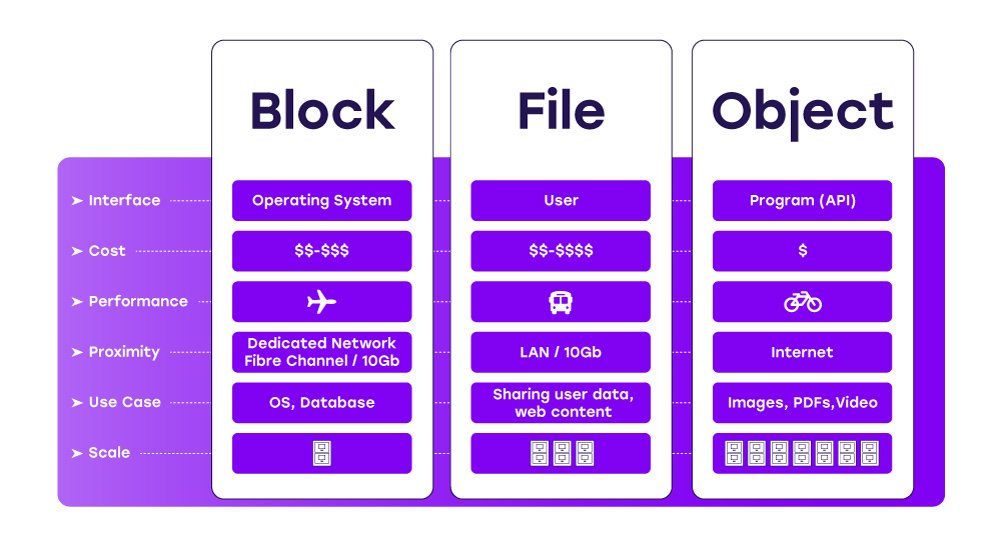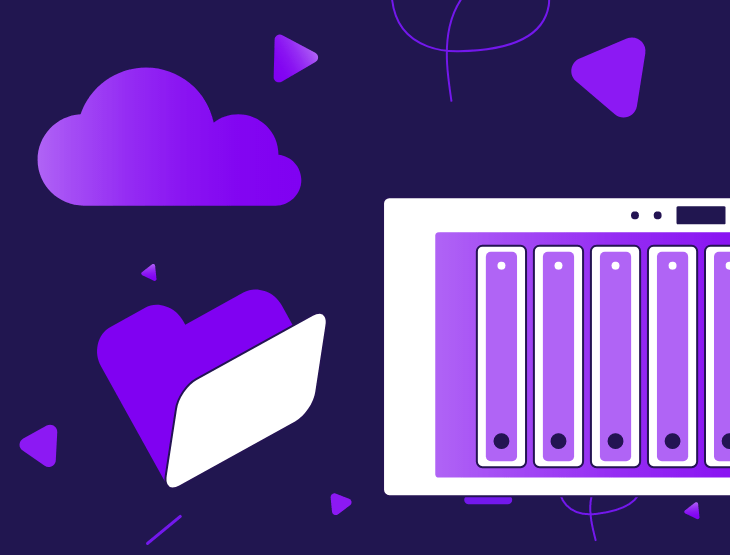Traditional Storage vs Block Storage vs Object Storage
With such a range of storage choices on the market it can be hard to know how to make the right choice. Whilst there are three levels of storage to choose from – traditional (file), block, and object based storage systems – each one has its own pros and cons. At Vitanium we can help you make the right choice about storage, but first let’s take a look at the options.
Traditional Storage
Traditional storage uses local physical drives to store data on site. Data is usually stored on servers and may be accessed using Network Attached Storage protocols. The data is stored on disks and the number of disks can be increased in order to scale up storage, although this is limited. Data often has to be stored in multiple locations to avoid complete data loss due to equipment damage or other problems on site.
Pros:
- Simple to set up.
- Security can be manually set up by the user or administrator.
- Shared data access allows users to read and write files at the same time.
- Suitable for a mixture of structured and unstructured data.
Cons:
- Lack of space can quickly become an issue as data needs increase.
- Losing records is a risk due to human error, equipment failure or damage of backups, servers etc.
- Record organisation uses file hierarchy which can be time consuming when locating files.
- As your data needs grow it can prove expensive to add physical storage.
- Adding new storage can take time. For example, procuring hardware and equipment as well as installing, testing, and implementing it.
- Requires management.
Block Storage
In block storage, data is broken down into blocks and stored separately, each block using a unique identifier. Blocks can be stored across different systems and can be compatible with different operating systems. Block storage uses Storage Area Networks (SANs) or cloud-based storage environments.
Pros[i]:
- Low delay rate for applications.
- High performance – suitable for almost any kind of application, including file storage, database storage, virtual machine file system (VMFS) volumes, and more.
- Highly redundant if using RAID, which makes data more resilient.
Cons:
- Blocks have limited metadata about the information they’re storing. Any additional information must be handled at application or database level, which adds complexity or personnel needs.
- Can be expensive.
- Block storage needs a substantial amount of setup time and expertise to manage.
Object Storage
Object storage stores all data as individual objects in a flat storage pool. The metadata becomes the means by which data is found and retrieved, rather than its file location. As object storage grows it can be scaled out horizontally, but the metadata stays with the objects allowing for a flat system, and in flat data environments scalability is almost without limits.
Pros[ii]:
- Cost effective in comparison to other methods.
- Scalability.
- Convenient file retrieval using a unique URL.
- Data generated via IOT devices such as phones, smart watches, speaker systems, home security is well suited to Object Storage.
- Can be used for long term archiving.
- Access anywhere via the Internet.
- Well suited to multimedia files.
- Requires virtually no management.
Cons:
- Works best for unstructured data types.
- Objects are considered complete units and can only be viewed, updated, and rewritten as entire objects.
- Operating systems can’t easily mount an object store like a normal disk.
Comparing the options

In conclusion
Traditional storage is struggling to keep up with the modern demands of web-based content and unstructured data. Users need to consider other storage options that organise and access data differently.[iii] File and block-based storage can be expanded, but reliability may be put to the test as storage needs soar with the exponential growth of data. Object storage exists to overcome these challenges by storing data as objects in a limitless flat address space.
How can I choose the correct storage option?
Identifying your individual needs is the first step in deciding which type of storage best suits your organisation.
At Vitanium we offer object storage with a highly-secure, high-performance and reliable S3 compatible solution. What’s more we only use UK Data centres and our service is fully backed up by a UK support team. We can also help you with data backup and archiving solutions.
If you’d like to talk over your storage needs, get in touch with our friendly team today and we’ll be happy to find the perfect solution for you.

